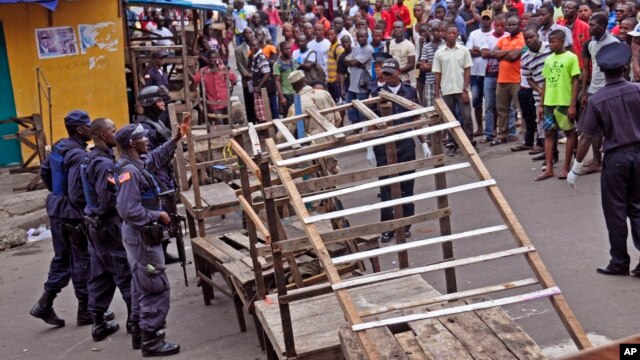
FILE - Liberia security forces blockade an area around the West Point Ebola center as the government clamps down on the movement of people to prevent the spread of the Ebola virus in Monrovia, Liberia.
UNITED NATIONS—
The U.N. peacekeeping chief is urging the Security Council to extend the mandate of its 7,000-member peacekeeping force in Liberia, as the Ebola crisis continues to strain national institutions and threaten gains made since that country’s civil war ended in 2003.
Head of U.N. Peacekeeping, Hervé Ladsous, told the Security Council on Wednesday that plans to continue to gradually draw down the mission have been put on hold as Liberia struggles to cope with an Ebola outbreak that has killed more than 2,800 people.
“In the current circumstances, we are of the view that it would be appropriate to extend the mandate of UNMIL until September 2015, while taking forward the set of recommendations on political issues and deferring consideration of the drawdown of troops and police until such time as the appropriate health authorities inform that the Ebola crisis is over,” said Ladsous.
Ongoing work
UNMIL is the acronym by which the U.N. Mission in Liberia is known.
The mission has been in the West African country for more than a decade, helping the authorities rebuilding and developing capacity of state institutions, and maintaining law and order.
In September, the Security Council renewed the mission only until the end of this year, but said it intended to further extend it through September 2015. A council resolution authorizing an extension will have to be adopted before December 31.
Liberia’s U.N. Ambassador, Marjon Kamara, welcomed the proposed extension. She said her government would like to see UNMIL extended for a full year, and she asked the council to postpone its consideration of adjusting the mission’s work.
“We humbly suggest that a declaration by WHO that Liberia is Ebola-free should provide an opportunity for the council to authorize a comprehensive assessment of the conditions on ground. As was the case in the past, the outcome of such an assessment would guide further action by the council,” said Kamara.
Council members are likely take into consideration the impact of the Ebola crisis on the political and security situation in deciding on the length of the mandate extension. Weak national institutions have been overwhelmed by the crisis, the economy is struggling and schools have shut.
A government-imposed 90-day state of emergency expired this week and it is not yet clear whether it will be extended. The health crisis also has affected the electoral process, with the cancellation of legislative elections in October.
Liberian authorities are considering whether to reschedule elections for next month if the virus’ spread is under control. |
|
